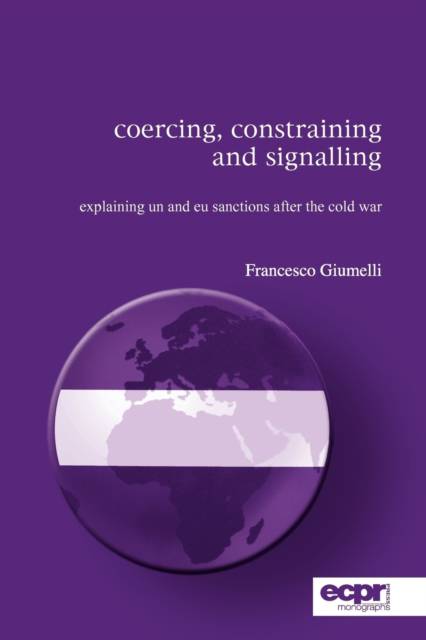
Door een staking bij bpost kan je online bestelling op dit moment iets langer onderweg zijn dan voorzien. Dringend iets nodig? Onze winkels ontvangen jou met open armen!
- Afhalen na 1 uur in een winkel met voorraad
- Gratis thuislevering in België vanaf € 30
- Ruim aanbod met 7 miljoen producten
Door een staking bij bpost kan je online bestelling op dit moment iets langer onderweg zijn dan voorzien. Dringend iets nodig? Onze winkels ontvangen jou met open armen!
- Afhalen na 1 uur in een winkel met voorraad
- Gratis thuislevering in België vanaf € 30
- Ruim aanbod met 7 miljoen producten
Zoeken
Coercing, Constraining and Signalling
Explaining UN and EU Sanctions After the Cold War
Francesco Giumelli
€ 73,45
+ 146 punten
Omschrijving
The costs of military ventures and concern for human rights have increased the importance of international sanctions in the twenty-first century, but our knowledge is still limited in this area. The United Nations sanctions on Libya, Al Qaeda and Rwanda, or the European Union restrictive measures on the US, Transnistria and Uzbekistan are sparsely covered by the media and attempts to measure the effectiveness of any of these sanctions comes up against the fundamental (unanswered) question: What can sanctions do and when? This book enhances our understanding of how sanctions work and explains what we can expect from their imposition. Through analysis of the sanctioning experience of the UN and EU after the Cold War, the investigation tests a comprehensive theoretical model and concludes that the context in which sanctions are imposed is crucial in deciding the type of sanctions adopted. Giumelli shakes our preconceptions on sanctions and sets the terms for more constructive debates in the future.
Specificaties
Betrokkenen
- Auteur(s):
- Uitgeverij:
Inhoud
- Aantal bladzijden:
- 226
- Taal:
- Engels
- Reeks:
Eigenschappen
- Productcode (EAN):
- 9781907301209
- Verschijningsdatum:
- 1/09/2011
- Uitvoering:
- Paperback
- Formaat:
- Trade paperback (VS)
- Afmetingen:
- 155 mm x 231 mm
- Gewicht:
- 340 g

Alleen bij Standaard Boekhandel
+ 146 punten op je klantenkaart van Standaard Boekhandel
Beoordelingen
We publiceren alleen reviews die voldoen aan de voorwaarden voor reviews. Bekijk onze voorwaarden voor reviews.











